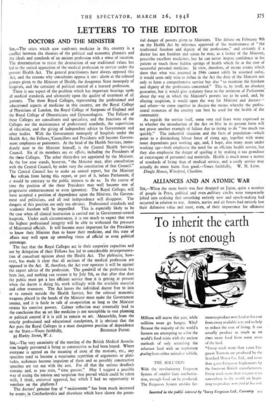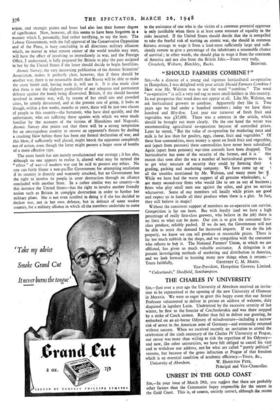ALLIANCES AND AN ATOMIC WAR
Sta,—When the atom bomb was first dropped on Japan, quite a number of people in Press, political and even ,military circles were temporarily jolted into realising that something entirely new and epoch-making had occurred in relation to war. Armies, navies and air forces had entirely lost their defensive value and most, even, of their importance for offensive
action, and strategic points and bases had also lost their former degree of significance. Now, however, all this seems to have been forgotten in a manner which I, personally, find rather terrifying, to say the least. The Labour Government, with the full approval of the Conservative Opposition and of the Press, is busy concluding in all directions military alliances which, no matter in what remote corner of the world trouble may start, will have the effect of involving us immediately in war, and the Foreign Office, I understand, is fully prepared for Britain to play the part assigned to her by the United States if the latter should decide to begin hostilities.
Atomic Survey, the very interesting publication of the Atomic Scientists' Association, makes it perfectly clear, however, that if there should be another war, there is no reasonable doubt that Russia will be able to make the atom bomb and, having made it, will use it. It is also made clear that there is not the slightest probability of any adequate and permanent defence against the bomb being discovered. Britain, if she should become involved in atomic war, will, by reason of her small size and crowded cities, be utterly devastated, and at the present rate of going, it looks as though, within a few weeks, months or years, there will be just two classes of people in this country—the fortunate, who have died quickly, and the unfortunate, who are suffering those agonies with which we were made familiar by the accounts of the victims of Hiroshima and Nagasaki. Atomic Survey also points out that there will be a strong temptation for an unscrupulous country to answer an opponent's threats by dealing a crushing blow before there has been any formal declaration of war, and this blow, if sufficiently well placed, might knock the opponent completely out of action, even though the latter might possess a larger store of bombs of a more effective type.
The atom bomb has not merely revolutionised war strategy ; it has also, although no one appears to realise it, altered what may be termed the " ethics " of war—if modern war can be said to possess any ethics. No one can fairly blame a non-pacifist Government for attempting retaliation if its country is directly and wantonly attacked, but no Government has the right to involve its people in utter destruction through an alliance concluded with another State. In a rather similar way no country—in this instance the United States—has the right to involve another friendly nation such as Britain in complve destruction in order to further her military plans. She is not even justified in doing it if she has decided to declare war, not in her own defence, but in defence of some weaker country, for a military alliance in which all the members undertake to come to the assistance of one who is the victim of a common potential aggressor is only justifiable when there is at least some measure of equality in the risks incurred. If the United States should decide that she is compelled to take the fearful risk of starting an atomic war, she should in common fairness arrange to wage it from a land-mass sufficiently large and suffi- ciently remote to give a percentage of the inhabitants a reasonable chance of survival ; in other words, she should plan to wage it from the continent of America and not also from the British Isles.—Yours very truly, Crozoholt, Woburn, Bletchley, Bucks. BEDFORD.



































 Previous page
Previous page